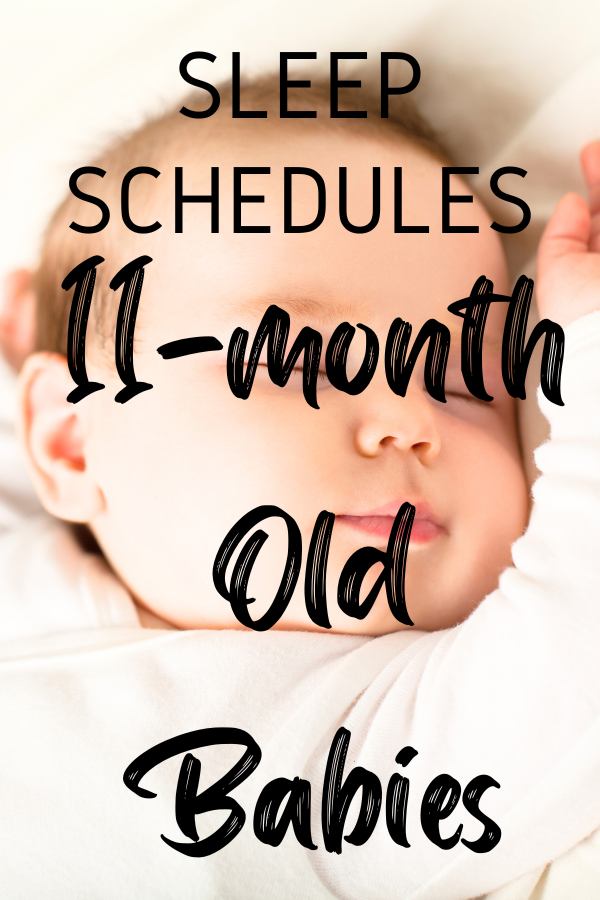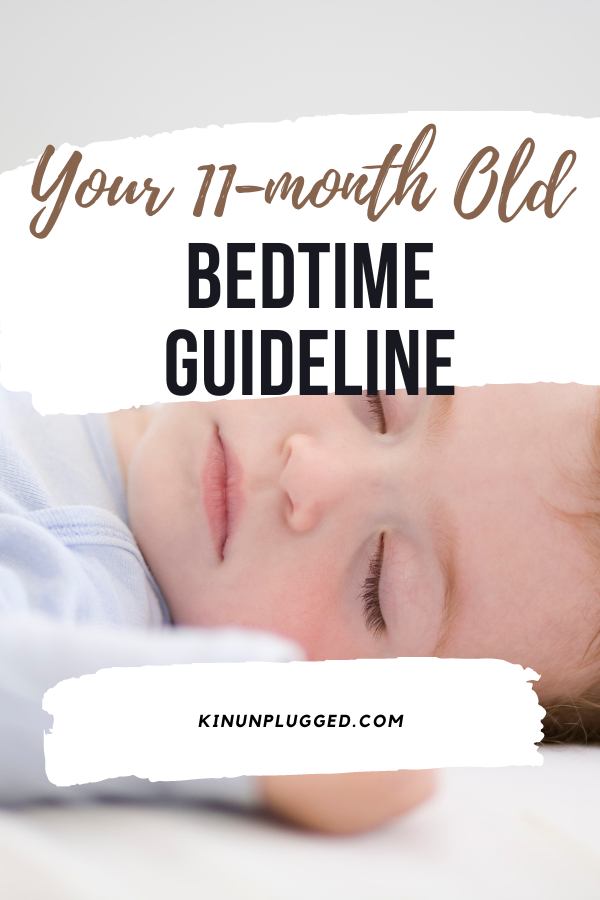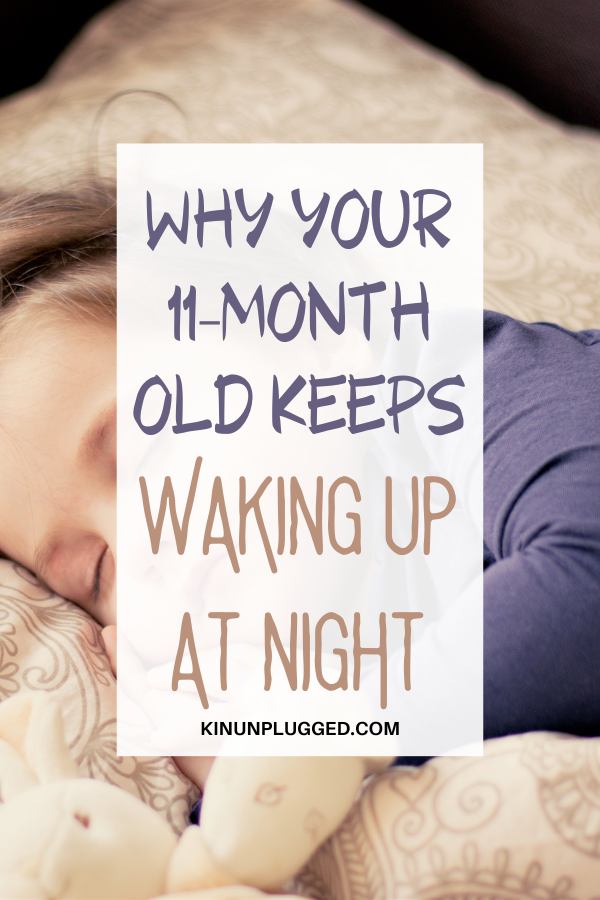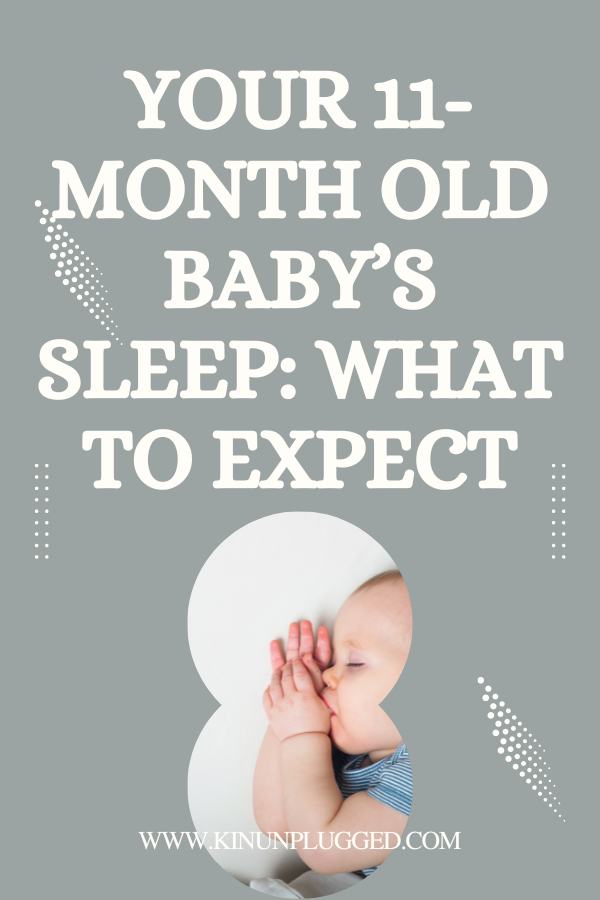At 11 months old, both my babies were very different from each other. Particularly with sleep. I’m going to guess that your 11 month old sleep schedule is different from both of mine too because you never know what to expect with babies.
Generally though, there are some similarities at that stage. Your 11 month old baby is likely to mirror your friend’s baby of the same age in some areas and sometimes, their sleep schedules are one of those areas.
In this article, we will consider and answer some of the more frequently asked questions pertaining to the 11 month old sleep schedule.
I will also share a sample sleep schedule with you to give you a guide as to how their sleep tends to pan out at this age. And yes, it will take the dreaded 11 month old sleep regression into account!

Let’s start with this: are you putting your baby down to sleep at an appropriate time for their age?
What time should an 11 month old go to bed?

Your 11 month old should ideally be going to bed about 12 hours after their morning wake up time.
The recommended bedtime for an 11-month-old can vary depending on their individual sleep patterns, but generally, most infants in this age group need around 11-12 hours of sleep at night, as well as 2-3 hours of daytime naps.
Here’s a rough guideline for bedtime
1. Aim for a bedtime routine
Establishing a consistent bedtime routine can help signal to your baby that it’s time to sleep. This routine might include activities like bath time, reading a book, singing a lullaby, or gentle rocking.
2. Gradual transition
By 11 months old, some babies may have transitioned to one nap during the day, usually in the morning. If your baby is still taking two naps, you might want to consider gradually transitioning to one longer nap in the middle of the day.
3. Adjust bedtime based on wake-up time
The ideal bedtime for your 11-month-old may depend on when they typically wake up in the morning. Most babies wake up around 6:30 to 7:30 AM, so a bedtime between 6:30 PM and 7:30 PM is common. However, if your baby wakes up earlier or later, you can adjust bedtime accordingly.
4. Pay attention to sleepy cues
Look for signs that your baby is getting tired, such as rubbing their eyes, becoming fussy, or yawning. These cues can help you determine when it’s time to start the bedtime routine.
5. Flexibility
Keep in mind that every baby is different, and their sleep needs can vary. Some babies may naturally have slightly earlier or later bedtimes. It’s important to pay attention to your baby’s individual sleep patterns and adjust their bedtime as needed to ensure they are getting enough sleep.
Is it OK to let an 11 month old cry it out?
Whether or not it’s okay to let an 11-month-old cry it out depends on your parenting philosophy and your baby’s individual needs. Some parents choose to use the cry it out method at this age, while others opt for more gradual approaches to sleep training.
Whatever you choose, it’s important to be consistent, prioritize your baby’s safety and well-being and consult with a pediatrician if you have concerns.
Please remember that there is no one-size-fits-all approach to sleep training.
Here are my personal opinions on the cry it out method
Is there a sleep regression at 11 months?
Yes, there can be a sleep regression in an 11-month-old’s sleep schedule.
Sleep regressions are periods when a baby who previously had a relatively stable sleep routine may experience disruptions.
Around the 11-month mark, common factors that can contribute to sleep disturbances include teething, developmental milestones (such as learning to walk or talk), separation anxiety and adjustments in their nap schedule. During these regressions, your baby may have difficulty falling asleep, wake up more frequently during the night or experience shorter naps.
While sleep regressions can be challenging for both parents and babies, they are usually temporary. With consistent care and patience, your 11-month-old’s sleep schedule should eventually return to a more predictable pattern.
Why does my 11 month old keep waking up at night?

There are many possible reasons why your baby keeps waking up at night, considering their 11-month-old sleep schedule.
- Teething discomfort
Discomfort from teething can disrupt your 11-month-old’s sleep schedule, causing nighttime awakenings.
RELATED: 5 Unique Teething Foods for a hungry but uncomfortable toddler
- Developmental milestones
The pursuit of developmental milestones like learning to walk or talk can lead to nighttime waking as your baby practices these new skills.
- Separation anxiety
At this age, separation anxiety can intensify, causing your baby to seek comfort and reassurance, leading to disruptions in their 11-month-old sleep schedule.
- Changes in sleep schedule
Transitioning from two naps to one or other schedule changes can confuse your baby’s sleep routine and result in nighttime awakenings.
- Hunger
Growing babies may still require nighttime feeds, impacting their sleep schedule.
- Diaper discomfort
Wet diapers can cause discomfort, prompting your baby to wake up during the night.
RELATED: 7 Effective hacks to stop overnight diaper leaks
Is 11 months too early for one nap?
Around 11 months old, many babies are in the process of transitioning from two naps to one nap per day, but the timing of this transition can vary from one child to another. It’s not necessarily too early for some babies to begin transitioning to one nap, while others might continue with two naps for a bit longer.
The transition to one nap typically occurs when your baby is showing signs of being able to stay awake for longer periods during the day and consolidating their sleep at night. Some common signs that your baby might be ready for this transition include:
- Resisting the morning nap or taking shorter morning naps.
- Showing consistent signs of tiredness in the afternoon.
- Lengthening the duration of their single nap.
It’s important to be flexible and pay attention to your baby’s individual sleep needs and patterns. If your 11-month-old is still taking two naps and seems to be well-rested and happy, there’s no need to rush the transition.
On the other hand, if they are consistently resisting one of their naps and seem ready for a longer awake time during the day, you can start experimenting with a single longer nap in the middle of the day.
Consulting with your pediatrician or a sleep specialist can also provide guidance tailored to your baby’s specific sleep needs and help you make the transition smoothly. Every baby is different and there’s no one-size-fits-all answer when it comes to nap transitions.
What should I expect from my 11 month old sleep schedule?

At 11 months old, your baby’s sleep schedule will continue to evolve but there are some general expectations for their sleep patterns.
- Nighttime sleep
They may still wake up once or twice during the night for feeds or comfort, but they are generally capable of longer stretches of sleep. Establishing a consistent bedtime routine can help them settle into a nighttime sleep pattern.
- Nap schedule
Many 11-month-olds transition from two naps to one nap during the day. This single nap typically lasts 1.5 to 2.5 hours and occurs in the middle of the day, usually after lunch. However, some babies might still need two shorter naps, while others may transition to one longer nap.
- Awake times
Your 11-month-old can usually stay awake for longer periods between naps, typically around 3-4 hours. This increased wakefulness during the day is a sign of their growing ability to consolidate sleep at night.
- Consistency
A consistent sleep schedule and bedtime routine are crucial at this age to help your baby establish healthy sleep habits. Having a predictable routine can signal to your baby when it’s time to sleep.
- Night wakings
While many babies can sleep through the night, it’s normal for 11-month-olds to have occasional night wakings due to teething, developmental milestones or other factors. They may need comforting, feeding or reassurance during these awakenings.
- Independence
Your baby may start to show more signs of independence when it comes to falling asleep. They may be able to self-soothe to some extent, such as finding their thumb or a comfort object.
- Separation anxiety
At this age, separation anxiety can peak, which may lead to more nighttime awakenings as your baby seeks comfort and reassurance.





